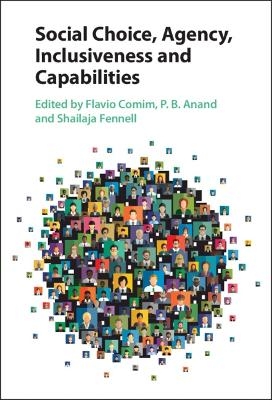
Social Choice, Agency, Inclusiveness and Capabilities
Cambridge University Press (Verlag)
978-1-009-23270-8 (ISBN)
The capability approach is a versatile framework rooted on issues of justice and multidimensional assessment of quality of life developed in the 1980s as an alternative approach to prevailing mainstream development ideas focused narrowly on economic development. Most closely associated with the work of Amartya Sen, it has become of great interest to development scholars from a variety of different disciplines. Much has already been done exploring the conceptual foundations of the capability approach and discussing Sen's contribution to the field, but few books have explored the links between social choice (another field with rich contributions by Sen) and human development issues. Featuring many of the world's leading experts on social choice theory and capability indicators, Social Choice, Agency, Inclusiveness and Capabilities combines these interrelated themes into one volume and fully explores the relevance of social choice to human development.
Flavio Comim is Associate Professor of Economics and Ethics at IQS School of Management at the Ramon Lllull University. P. B. Anand is Professor of Public Policy and Sustainable Development and Head of the Department of Peace Studies and International Development at the University of Bradford. Shailaja Fennell is Professor of Regional Transformation and Economic Security, Department of Land Economy, and Director, Centre of South Asian Studies, at the University of Cambridge.
Introduction: social choice, agency, inclusiveness and capabilities Flavio Comim, P. B. Anand and Shailaja Fennell; 1. The many facets of social choice theory Wulf Gaertner; 2. Beyond capabilities? Sen's social choice approach Flavio Comim; 3. Examining the challenge of communication in diffusing innovative education programmes: an analysis drawing on public choice, social choice and capability framings Shailaja Fennell; 4. Nudging the capabilities for a sustainable city? When the libertarian paternalist meets the paretian liberal P. B. Anand; 5. Strengthening research capacity in Northern Nigeria: identity, choice and capability Michael Watts, Nafisa Waziri and Oladele Akogun; 6. In defence of inclusiveness: on sustainable human development, capability and indicators of progress Mozaffar Qizilbash; 7. Exploring sen on self-interest and commitment Gay Meeks; 8. Incorporating an emotional dimension in the capability approach John Cameron; 9. Sufficiency reexamined Jay Drydyk; 10. Adaptive preferences vs Internalisation in deprivation: conceptual comparison between the capabilities approach and the self-determination theory Tadashi Hirai; 11. Capabilities and relational ontologies: Sen and indigenous theories of development Ana Estefania Carballo; 12. Creativity and capabilities: a problem of change and uncertainty? Jonathan Warner; 13. 'Measuring the Independence of 'Dependent' persons based on the capability approach' Hideyuki Kobayashi and Reiko Gotoh; 14. Indigenous challenges to the capability approach: a relational ontology of community and sustainability Ana Estefania Carballo; 15. Situating the family within the capabilities framework: a collective conversion factor. The role of the household configuration in the quality of life in Mali Claudine Sauvain-Dugerdil and Siaka Cissé; 16. An ethical perspective on the UK's improving lives: the future of work, health and disability Jacques Tamin; 17. Public services as conversion factors: exploring the theory and practice Richard Brunner and Nick Watson.
| Erscheinungsdatum | 05.03.2024 |
|---|---|
| Zusatzinfo | Worked examples or Exercises; 23 Tables, black and white; 19 Line drawings, black and white |
| Verlagsort | Cambridge |
| Sprache | englisch |
| Themenwelt | Geisteswissenschaften ► Philosophie |
| Sozialwissenschaften ► Politik / Verwaltung ► Politische Theorie | |
| Sozialwissenschaften ► Soziologie ► Allgemeines / Lexika | |
| ISBN-10 | 1-009-23270-3 / 1009232703 |
| ISBN-13 | 978-1-009-23270-8 / 9781009232708 |
| Zustand | Neuware |
| Haben Sie eine Frage zum Produkt? |
aus dem Bereich


